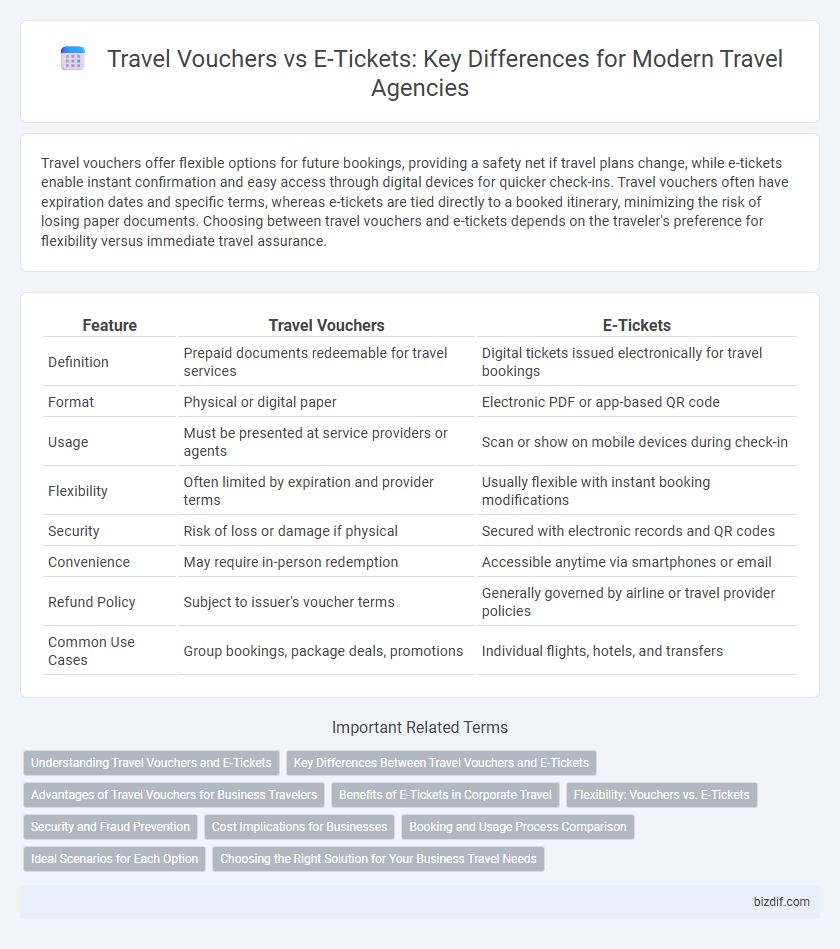Travel vouchers offer flexible options for future bookings, providing a safety net if travel plans change, while e-tickets enable instant confirmation and easy access through digital devices for quicker check-ins. Travel vouchers often have expiration dates and specific terms, whereas e-tickets are tied directly to a booked itinerary, minimizing the risk of losing paper documents. Choosing between travel vouchers and e-tickets depends on the traveler's preference for flexibility versus immediate travel assurance.
Table of Comparison
| Feature | Travel Vouchers | E-Tickets |
|---|---|---|
| Definition | Prepaid documents redeemable for travel services | Digital tickets issued electronically for travel bookings |
| Format | Physical or digital paper | Electronic PDF or app-based QR code |
| Usage | Must be presented at service providers or agents | Scan or show on mobile devices during check-in |
| Flexibility | Often limited by expiration and provider terms | Usually flexible with instant booking modifications |
| Security | Risk of loss or damage if physical | Secured with electronic records and QR codes |
| Convenience | May require in-person redemption | Accessible anytime via smartphones or email |
| Refund Policy | Subject to issuer's voucher terms | Generally governed by airline or travel provider policies |
| Common Use Cases | Group bookings, package deals, promotions | Individual flights, hotels, and transfers |
Understanding Travel Vouchers and E-Tickets
Travel vouchers are prepaid certificates issued by travel agencies or airlines, allowing travelers to redeem specific services such as flights, accommodations, or tours, often used as compensation for cancellations or promotions. E-tickets, or electronic tickets, serve as digital proof of a purchased flight or transportation seat, containing essential details like passenger information, flight number, and itinerary, which streamline check-in and boarding processes. Understanding the differences between travel vouchers and e-tickets helps travelers manage bookings effectively, ensuring clarity on redemption options and travel logistics.
Key Differences Between Travel Vouchers and E-Tickets
Travel vouchers act as prepaid credits issued by travel agencies or airlines, allowing travelers to redeem services such as flights, hotels, or tours at a later date, offering flexibility but often with expiration dates and usage restrictions. E-tickets are digital confirmations of booked flights, providing instant proof of purchase and direct access to travel services without physical documents, streamlining the check-in process. Key differences lie in their purpose--vouchers serve as payment alternatives or compensations, while e-tickets function as confirmed travel authorizations with specific flight details.
Advantages of Travel Vouchers for Business Travelers
Travel vouchers offer business travelers greater flexibility by allowing them to select flights, accommodations, or transport services that best fit their schedules and preferences, avoiding restrictions tied to specific bookings. These vouchers simplify expense management and budgeting, as companies can allocate a set amount for travel without dealing with detailed receipts and variable costs. Furthermore, travel vouchers enhance convenience by streamlining booking processes through partnering agencies, reducing booking time and improving overall travel efficiency for corporate clients.
Benefits of E-Tickets in Corporate Travel
E-tickets streamline corporate travel by offering instant booking confirmation and easy access via mobile devices, reducing the risk of lost or misplaced documents. They provide enhanced flexibility for itinerary changes, allowing employees to adjust travel plans quickly without administrative delays. Cost efficiency is increased as e-tickets eliminate paper handling and shipping expenses, contributing to overall corporate travel budget savings.
Flexibility: Vouchers vs. E-Tickets
Travel vouchers offer greater flexibility by allowing travelers to reschedule or use the credit for various services without strict expiration dates, unlike e-tickets which are often tied to specific flights with fixed dates and limited change options. This flexibility makes vouchers ideal for uncertain travel plans or last-minute changes. E-tickets provide convenience and instant confirmation, but their rigidity can result in penalties or forfeiture if plans change.
Security and Fraud Prevention
Travel vouchers offer enhanced security by being less susceptible to digital hacking compared to e-tickets, which can be vulnerable to cyber fraud and unauthorized access. E-tickets rely heavily on digital platforms, increasing risks of phishing attacks and ticket duplication, whereas travel vouchers often require physical redemption or direct validation, reducing fraud instances. Both methods implement authentication measures, but travel vouchers typically provide an added layer of fraud prevention through controlled issuance and redemption processes.
Cost Implications for Businesses
Travel vouchers offer businesses upfront payment options that can improve cash flow management, whereas e-tickets eliminate printing and delivery costs, reducing overhead expenses. Travel vouchers may involve additional administrative fees for redemption and expiration tracking, while e-tickets provide streamlined electronic record-keeping, cutting labor costs. Choosing between travel vouchers and e-tickets depends on the company's financial strategy, with e-tickets generally favored for lower transaction costs and efficient budget control.
Booking and Usage Process Comparison
Travel vouchers offer flexibility by allowing travelers to redeem credits for multiple services within a broader booking system, often requiring coordination with customer support or partner vendors. E-tickets streamline the booking process with instant confirmation, digital delivery, and direct usage at airlines or service providers, enabling fast check-ins and secure access. While travel vouchers may involve manual validation, e-tickets rely on automated scanning technologies, reducing wait times and enhancing convenience during travel.
Ideal Scenarios for Each Option
Travel vouchers serve ideal scenarios involving flexible travel plans, cancellations, or rescheduling needs, offering customers the ability to redeem services at a later date without losing value. E-tickets are optimal for straightforward itineraries where quick, paperless check-ins and immediate booking confirmations are priorities. Both options enhance convenience but cater to different traveler preferences depending on certainty and timing of travel.
Choosing the Right Solution for Your Business Travel Needs
Travel vouchers offer flexible payment options and can serve as gifts or incentives, ideal for businesses aiming to control travel budgets and support employee rewards. E-tickets provide immediate confirmation and seamless digital access, enhancing efficiency for companies that prioritize quick booking and streamlined travel management. Selecting between travel vouchers and e-tickets depends on your business's focus on flexibility versus speed and convenience in corporate travel arrangements.
Travel vouchers vs E-tickets Infographic

 bizdif.com
bizdif.com